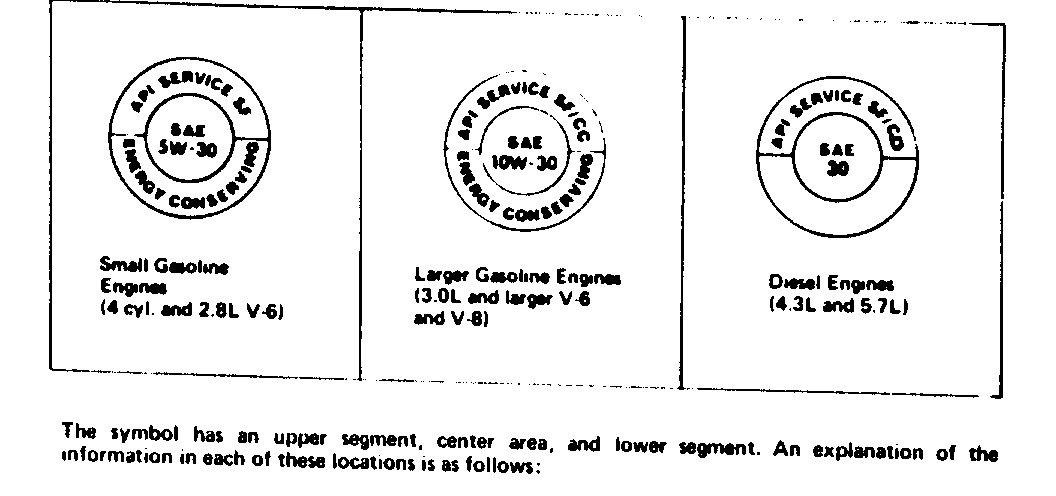ENGINE OIL RECOMMENDATIONS PREFERRED VISCOSITIES

Model and Year PASSENGER CARS AND LIGHT DUTY TRUCKS
The purpose of this bulletin is to:
Advise you of the reasons for changes in engine oil viscosity recommendations, and
Explain the new API service symbol which should assist vehicle owners in finding engine oils recommended for GM engines.
GASOLINE ENGINE OIL VISCOSITY RECOMMENDATIONS
Since 1980, the preferred viscosities for GM gasoline engines are SAE 10W-30 for the larger engines and SAE 5W-30 for the smaller engines (engines sizes defined later).
SAE 10W-40 is not included in the viscosity chart for 1984 GM gasoline engines, for several reasons, including:
Fuel economy with SAE 10W-30 oils is about 1% better than that with SAE 10W-40 oils.
SAE 10W-30 oils generally produce less piston and ring deposits than SAE 10W-40 oils. Such deposits can lead to stuck rings and increased oil consumption.
The use of SAE 10W-40 engine oil in a vehicle equipped with a gasoline engine will not automatically void the General Motors Corporation New Car Limited Warranty. However, since SAE 10W-40 engine oil is not recommended for use in 1984 GM vehicles equipped with gasoline engines, if the use of such oil causes damage, the cost of the engine repair will not be covered by the Warranty. The Warranty does not cover any damage due to the use of non-recommended oils, whether SAE 10W-40 or some other viscosity. In addition, the Warranty does not cover damages caused by the use of oils that do not meet the recommended API quality or SAE viscosity grade.
DIESEL ENGINE OIL VISCOSITY RECOMMENDATIONS
Preferred viscosities for diesel engines in GM passenger cars and light duty trucks are SAE 30 for the larger engines and SAE 10W-30 for the smaller engines.
SAE 10W-40 oils have never been recommended for diesel engines in GM passenger cars and light duty diesel trucks. Nevertheless, some owners have used SAE 10W-40 oils and, in some cases, experienced engine damage caused by excessive piston and ring deposits. In an effort to clarify the GM re- commendations for passenger cars and light duty trucks, the 1984 owner's manuals state specifically for diesel engines "DO NOT USE SAE 10W-40 GRADE OIL, OR ANY OTHER GRADE NOT RECOMMENDED".
If damage to a GM diesel engine is caused by the use of SAE 10W-40 engine oil, the cost of the engine repair will not be covered by the Warranty.
API ENGINE OIL SERVICE SYMBOL
A new API service symbol is being used in GM owner's manuals and on oil cans. Urge your customers to look for it in their manuals and on the containers of the oil they select for use in their cars. These are examples of the symbol:
Small Gasoline Larger Gasoline Larger Diesel Engines (3.0L and larger V-6 Engines (4 cyl and 2.8 L, V-6) and V-8) and (4.3, 5.7 and 6.2 L) Small Diesel (1.8 and 2.2 L) Engines
The symbol has an upper segment, center area, and lower segment. An explanation of the information in each of these locations is as follows:
Upper Segment: QUALITY LEVEL API (American Petroleum Institute) Service Categories -----------------------------------------------------
Gasoline Engines Diesel Engines ---------------- -------------- SF/CC SF/CD (preferred) SF/CD SF/CC SF
Center Area: OIL THICKNESS (Grade) SAE (Society of Automotive Engineers) Viscosity Classification --------------------------------------------------------------
Gasoline Engines Diesel Engines ---------------- -------------- SAE 5W-30 (preferred for SAE 30 (preferred above engines of 2.8 liters or less). freezing*).
SAE 10W-30 (preferred for SAE 10W-30 and SAE 15W-40 all other engines). (acceptable for all engines; use only for cold-weather SAE 15W-40, SAE 20W-20 and operation; helps starting). SAE 30 (acceptable for all engines). Except for 1.8 and 2.2 liter diesels, where SAE 10W-30 is preferred at all temperatures.
Lower Segment: FUEL ECONOMY RATING
"ENERGY CONSERVING"
Oils with these words provide more miles per gallon of fuel.
The Goodwrench line of engine oils recently introduced by GM meets these standards and provides proper lubrication protection for passenger cars and light duty trucks.

General Motors bulletins are intended for use by professional technicians, not a "do-it-yourselfer". They are written to inform those technicians of conditions that may occur on some vehicles, or to provide information that could assist in the proper service of a vehicle. Properly trained technicians have the equipment, tools, safety instructions and know-how to do a job properly and safely. If a condition is described, do not assume that the bulletin applies to your vehicle, or that your vehicle will have that condition. See a General Motors dealer servicing your brand of General Motors vehicle for information on whether your vehicle may benefit from the information.
